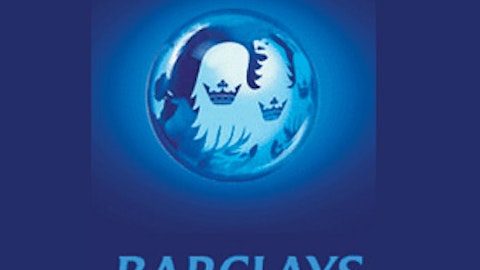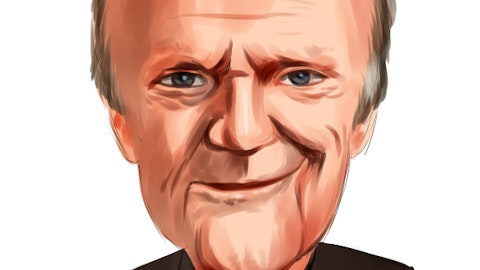Hedge funds such as Stephen Mandel‘s Lone Pine Capital and Philippe Laffont’s Coatue Management held big positions in Facebook Inc (NASDAQ:FB) at the end of March, owning 8.1 million shares and 7.9 million shares, respectively. Lone Pine’s position represented a decrease of 40% over the quarter, while Coatue raised its stake by 11%. Other funds with positions in Facebook at the last measure included Columbus Circle Investors, Adage Capital, and Blue Ridge Capital, with stakes ranging from 3 to 3.5 million shares. Those funds holding shares of Facebook did well over the last three months, with the stock gaining 22%, and we expect funds to largely maintain previous holdings or to initiate new positions as the stock has momentum on its side at the moment. Insider Monkey points out that hedge funds have done a good job with their long picks (read more details here), and we believe that hedge fund investment will add an element of stability to the stock price in the interim.

nevodka / Shutterstock.com
Fresh off new record highs, Facebook Inc (NASDAQ:FB) continues to outperform the market as a large-cap internet company. With a market capitalization of more than $260 billion, the social media network is now worth more than Wal-Mart Stores, Inc. (NYSE:WMT) and is poised to break higher as it looks to diversify its revenue streams through niche advertising, Instagram, and new products like Facebook at Work. The company also has a number of wild cards that can be converted into cash grabs, such as WhatsApp and mobile payment services. To the latter point, Facebook in 2014 hired former PayPal president David Marcus to begin monetizing its messaging platform, which has quickly become one of Facebook’s pillar products.
Quarterly Earnings Outpace Forecasts
Despite reporting significant expenses, Facebook surpassed revenue and profit forecasts in its second quarter. The company reported an earnings per share (EPS) of $0.50 on revenues of $4.04 billion. Second quarter revenues were up 39 percent over year-ago levels. Daily active users (DAUs) rose 17% annually to 968 million, with mobile DAUs averaging 844 million. The company boasted an astonishing 1.49 billion monthly active users in the latest quarter, an increase of 13% year-over-year.
Facebook Inc (NASDAQ:FB)’s continued success in 2015 has catapulted it into the top-10 largest US companies by market capitalization, overtaking the likes of General Electric Company (NYSE:GE), JPMorgan Chase & Co. (NYSE:JPM) and Amazon.com, Inc. (NASDAQ:AMZN).
10 Largest US Companies by Market Capitalization
| Company (ticker) | Market Cap (in billions) |
| Apple Inc (AAPL) | $691.74 |
| Google Inc (GOOGL) | $450.74 |
| Google Inc (GOOG) | $428.88 |
| Microsoft Corporation (MSFT) | $377.78 |
| Berkshire Hathaway Inc. (BRK.A) | $351.60 |
| Exxon Mobil Corp. (XOM) | $331.85 |
| Wells Fargo & Co. (WFC) | $297.98 |
| Johnson & Johnson (JNJ) | $277.89 |
| Facebook, Inc. (FB) | $264.00 |
| General Electric Co (GE) | $262.98 |
Source: The Online Investor
Huge Growth Potential
Facebook Inc (NASDAQ:FB) silenced its naysayers by growing its mobile advertising revenues at a time when the investing public criticized the company for its questionable growth potential. Since going public in May 2012, Facebook has relied exclusively on mobile advertising for its revenue growth; today, mobile ads account for three-quarters of the company’s total revenues.
The combination of loyal and active users, strategic acquisitions of social media and messaging platforms, and cutting-edge research and development give Facebook a competitive advantage over comparable large-cap players. Instagram, WhatsApp, Oculus, mobile payments and the professional network Facebook at Work could drive real value for the company in 2015 and beyond. Within existing revenue streams, Facebook’s advertising business is still in its early stages. According to analysts, the company’s growth potential is still very much tied to advertising, given that Facebook’s largest marketing clients are not even spending 5% of their budgets on the social network.
Facebook’s Stock Still Under-Owned
The company is “firing on all cylinders,” according to Citigroup, which recently upped its 12-month price target for the stock to $112 from $97. Amid global economic volatility, a surging US dollar and expectations for a Federal Reserve rate increase, Facebook has performed incredibly well in 2015, climbing nearly 20% year-to-date. By comparison, the S&P 500 Index has gained a meager 2.2% over the same period, while the benchmark Dow Jones Industrial Average has declined nearly 1%.
Despite Facebook’s resounding success since going public more than three years ago and its continuing strength in 2015, the company is still under-owned by institutional investors, according to Citigroup. The bank’s recent survey of the top 40 institutional investors, which represent nearly two-thirds of the total institutional holdings among large-cap internet stocks, found Facebook to be among the most underweight, along with Google (GOOG) (GOOGL).
“We believe FB and GOOGL may have the greatest near-term opportunity among large-cap internet to benefit from portfolio re-weighting if they execute consistent with current investor expectations,” Citigroup’s detailed report showed, as quoted by MarketWatch.
Facebook Inc (NASDAQ:FB) is aggressively expanding into areas outside of its core social networking business. The company earlier this year announced it would add 1,200 new workers, the outgrowth of CEO Mark Zuckerberg’s ambitious vision to capitalize on its virtual reality products. The social network’s continuous expansion, both organically and via strategic acquisitions, will keep shareholders excited for a very long time.
Whether for short-term profit or long-term investment, the consensus on Wall Street is a ‘Buy’ for the stock. Combined with the underweight stance by institutional investors and substantial hedge fund investment, the stock still has room to run and its various initiatives give credence to the belief that Facebook Inc (NASDAQ:FB) will not fade, but continue to make investments to create value for its shareholders and maintain its dominant presence in social media. Thus, Facebook’s significant gains and rise to one of the largest companies in the U.S. is not a cause for alarm, but a signal to invest in a company with still a prosperous future.
Disclosure: none





